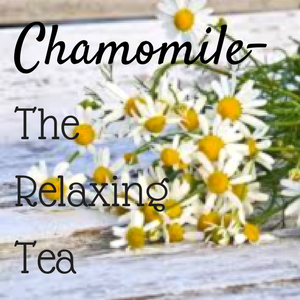
A lot of people come into the shop asking if we have teas which help with arthritis, or with stomach aches, or with any other assortment of ailments. Our response is usually that we sell tea, and that they should probably try a doctor. There’s a great deal of the lore out there about the healing properties of various herbal teas is just that-- lore.
 However, chamomile is the exception to that rule. Chamomile has a storied folk history. It is known as everything from a hair treatment to an anti-inflammatory, and is renowned for its ability to reduce anxiety and insomnia. While I would usually say that these claims are likely poorly scientifically researched, and mostly based on baseless speculation, chamomile is the exception. Chamomile has been heavily researched, and has been proven, as well as science will ever admit that anything is certain (please see global warming and evolution still being called theories) that chamomile has anti-depressant, anti-anxiety, and sedative properties.
However, chamomile is the exception to that rule. Chamomile has a storied folk history. It is known as everything from a hair treatment to an anti-inflammatory, and is renowned for its ability to reduce anxiety and insomnia. While I would usually say that these claims are likely poorly scientifically researched, and mostly based on baseless speculation, chamomile is the exception. Chamomile has been heavily researched, and has been proven, as well as science will ever admit that anything is certain (please see global warming and evolution still being called theories) that chamomile has anti-depressant, anti-anxiety, and sedative properties.
Firstly, to get it out of the way, you will find chamomile spelled as both chamomile and as camomile. Camomile is the British English version, while chamomile is the American English version.
There are also two different varieties of chamomile- German and Roman. German chamomile is generally used more often for aromatherapy, while Roman chamomile is used more often for teas. The two plants are actually quite different. Roman chamomile is a perennial plant, while German chamomile is annual. German chamomile produces much more oil, hence it being used for aromatherapy.
 Chamomile has been traditionally used for a wide variety of purposes. It can be used to enhance the yellow color of blonde hair. It contains alpha-bisabolol, which has antiseptic properties. The bisabolol, along with a few other components of chamomile, all have anti-inflammatory properties. It has been used to treat hay fever, menstrual disorders, and chickenpox. I’m going to avoid getting too excited about any of these things, because they’re likely unsubstantiated folk wisdom.
Chamomile has been traditionally used for a wide variety of purposes. It can be used to enhance the yellow color of blonde hair. It contains alpha-bisabolol, which has antiseptic properties. The bisabolol, along with a few other components of chamomile, all have anti-inflammatory properties. It has been used to treat hay fever, menstrual disorders, and chickenpox. I’m going to avoid getting too excited about any of these things, because they’re likely unsubstantiated folk wisdom.
 What I am going to get excited about is chamomile as an antianxiety. This has been somewhat extensively researched by the NIH in this paper. Does this mean that, if you have anxiety, chamomile will treat it? Probably not. But it does mean that if you have an interview to ace, a test to survive, or, perhaps, are in the middle of finals, a cup of chamomile will likely help. Not just because it smells like something between hay and warm bread, but also because it has proven anti anxiety qualities. Another NIH paper has concluded that, “Chamomile may provide clinically meaningful antidepressant activity that occurs in addition to its previously observed anxiolytic activity.” What this means is that chamomile’s storied reputation as a relaxing, mood lifting drink is likely actually based in fact, and this is the ultimate tea for a moment of peace in the middle of a hectic day.
What I am going to get excited about is chamomile as an antianxiety. This has been somewhat extensively researched by the NIH in this paper. Does this mean that, if you have anxiety, chamomile will treat it? Probably not. But it does mean that if you have an interview to ace, a test to survive, or, perhaps, are in the middle of finals, a cup of chamomile will likely help. Not just because it smells like something between hay and warm bread, but also because it has proven anti anxiety qualities. Another NIH paper has concluded that, “Chamomile may provide clinically meaningful antidepressant activity that occurs in addition to its previously observed anxiolytic activity.” What this means is that chamomile’s storied reputation as a relaxing, mood lifting drink is likely actually based in fact, and this is the ultimate tea for a moment of peace in the middle of a hectic day.
Technically, I should have trusted chamomile’s effects from the beginning. One of our customers, who, if he is reading this, will know exactly who he is, took to adding chamomile to his tea one midterm season. Regardless of what the tea was. Try adding chamomile to your usual teas, and see how it tastes. Tell us how it goes in the comments below
Buy our Chamomile teas right here!
